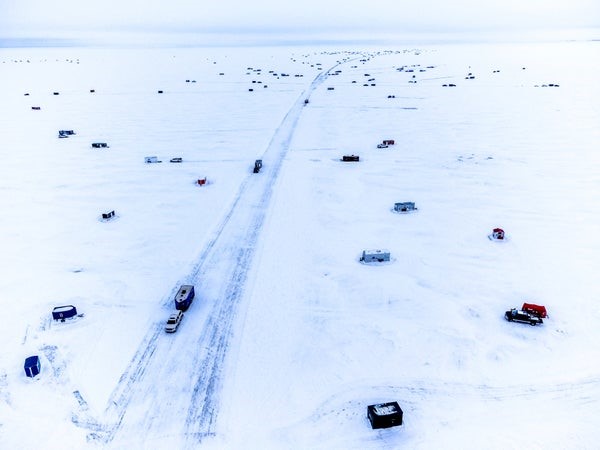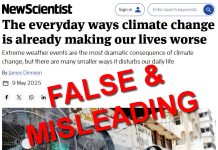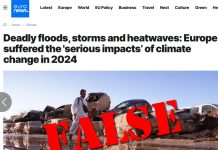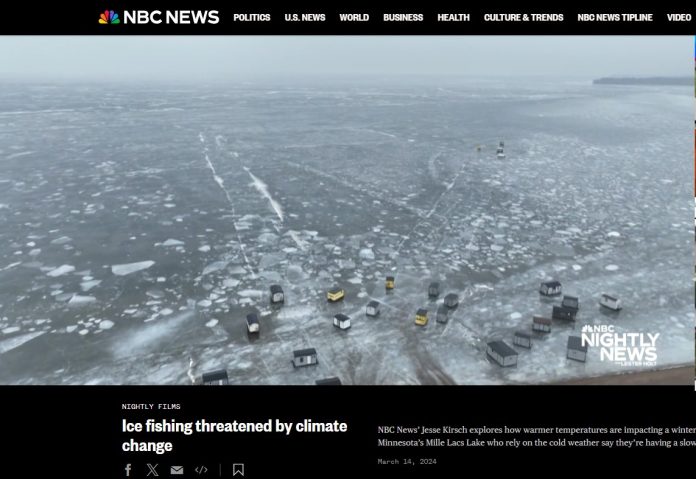A broadcast by NBC News, titled “Ice fishing threatened by climate change,” claims that warmer winters, particularly the 2023/2024 winter, is affecting the ice fishing season due to supposed influences from climate change. This is false. Climate change does not make such localized effects in a short time, and it is well established that the warmer weather pattern this winter is a result of El Niño patterns in the Pacific Ocean.
The story begins stating:
NBC News’ Jesse Kirsch explores how warmer temperatures are impacting a winter tradition. Business owners near Minnesota’s Mille Lacs Lake who rely on the cold weather say they’re having a slow season.
The video then proceeds with interviews of ice fishermen and local business owners who are the bemoaning the fact that they are having a slow season. In the video they say “over the past 50 years Minnesota has lost 10 to 14 days of lake ice” but they did not back that up with any scientific citation.
First, it has to be said that any single winter having warmer than normal temperatures and the resultant less ice is in fact due to short term weather patterns not long-term climate change. It is well defined that climate change takes place over 30 years. As discussed in Climate at a Glance: Weather vs. Climate:
The World Meteorological Organization (WMO) defines climate as “…the average weather conditions for a particular location and over a long period of time.” To create a climate record, 30 years of weather data is averaged to create a “normal” climate expectation for a location or region. What we experience on a day-to-day basis are weather events, not climate events. Weather is not climate.
Therefore, the 2023/2024 winter is cannot be attributed to climate change unless it is indicative of a long-term trend, but no evidence of such a sustained trend is found in the record.
It is already well established that the warmer temperatures of the 2023/2024 winter are a direct result of a significant El Niño pattern in the Pacific Ocean, affecting much of the United States. For example this report from Fox weather details the connection in US just had its warmest winter in history thanks to El Nino.
The story goes on to say:
“El Niño played a large role in the record heat,” said FOX Forecast Center Meteorologist Cody Braud. “The pattern for El Niño typically means a strong Pacific Jet, which displaces the Polar Jet farther to the North. There are obviously other facets to the story, but this largely keeps the coldest air trapped out of the Lower 48.”
That is clearly a short-term weather pattern, not climate.
Contrary to this year’s pattern, back in the winter of 2019 it was significantly colder and Minnesota had one of their biggest ice fishing tournaments ever with over 10,000 people on the ice in a single lake. As outlined in this story in Men’s Health titled: “Ice fishing event expects enormous crowd, More than 10,000 people will gather on frozen ice of Gull Lake, Minnesota, for world’s largest charitable ice fishing contest Saturday.” The story includes photographs of the lake covered by thousands of people and ice huts.
More recently, in January 2022, ice was thick enough to support vehicles in addition to the usual fishing huts as the photo below shows.

Clearly, prior to the 2023/2024 winter ice fishing seemed to be doing quite well in Minnesota. One bad year is not evidence of climate change. This winter’s low and thin ice is a result of weather patterns this year that created a warmer winter in the United States, and of course, Minnesota.
It’s just as likely that next year Minnesota may find a record cold and a longer than normal ice fishing season next year because that is how variations in weather patterns work. Discussing this point, the National Oceanic and Atmospheric Administration writes:
Some examples of this longer time-scale variability might include a series of abnormally mild or exceptionally severe winters, and even a mild winter followed by a severe winter. Such year-to-year variations in the weather patterns are often associated with changes in the wind, air pressure, storm tracks, and jet streams that enclose areas far larger than that of your particular region.
If Minnesota has a banner ice fishing season next year, it is doubtful NBC News will send a reporter to cover it and correct its story from this year. This sort of singling out of particular weather events is part of a troubling pattern in which the media tries to link virtually anything that might be thought of as abnormal weather to climate change even when no long-term trend is evident.
For the media, pushing the climate alarm narrative seems to be more important than reporting factually on a story.

















